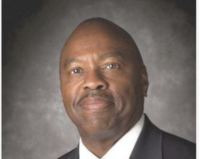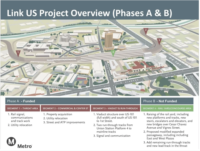“I cannot wait to have a 15-year-old talk to me about design-build and P3s.”
That 15-year-old, for Phillip Washington, would be a future student at the SEED School of Los Angeles County, a planned college-prep boarding school focusing on transportation and infrastructure careers for vulnerable youth. Construction began on the school last October, with 125 students expected in 2022. The school is the result of efforts by Washington, CEO of the Los Angeles County Metropolitan Transportation Authority (Metro), in partnership with L.A. County.
It will be Washington’s swan song as he prepares to step down from his post this spring after six years of heading Metro as an “activist CEO” who viewed transportation and infrastructure as tools to create connections and communities—where in the past, they have often created socioeconomic and racial division, he told members of the Airport Minority Advisory Council (AMAC).
Washington was the kickoff speaker at AMAC’s “From 30,000 Feet” series of power talks Feb. 9, with moderator Kelli Kelly, director of business development and strategy for aviation and transit at Kiewit.
Washington discussed growing up in a single-mother household in the Chicago housing projects—where, he noted, the Dan Ryan Expressway divided black and white neighborhoods—as well as his mentors in the Army and his experience as CEO with Metro and previously with Denver’s Rapid Transit District (RTD). “Being a new CEO going into an organization is like being a foreign substance injected into a living organism,” he said. “Either you change it or it changes you … the psychological ups and downs are incredible. You can’t get too up when things go well and can’t get too down when things don’t go well.”
He said he stuck to a mantra he learned from a sergeant in his first air defense artillery unit who told him: “I should be able to put you on any one of these jobs in this unit and you should be able to function within 90 days.”
Thanks to a sergeant major agreeing to shorten his last year of service to six months, and to the then-head of RTD agreeing to wait those six months, he joined RTD and launched his transportation career. “You never know who will be in your corner at the most inopportune time,” Washington said.
In both posts, Washington oversaw billions of dollars in construction projects and major outreach programs for women, people of color and youth. As an “activist CEO,” he said: “We are public figures and we are supposed leaders. I feel like we must speak out on various issues. We serve the public. We don’t control everything. But we can influence, instigate, inspire … I believe that we should be speaking out on issues of the day that impact transportation. I can’t think of any other discipline that impacts more people, except health care.”
Equity and inclusion, he emphasized, were key to Metro decisions during his tenure. “We have the highest percentage of low-income riders here in LA. Why wouldn’t I speak out and be an activist as it relates to equity, inclusion, and affordable housing? We cannot be just an agency running buses and trains … We have a say in land use policy, employment and hiring, education and internship opportunities. We have a say in the planning of communities.”
At Metro, Washington and his staff used personnel evaluations and reports to make sure women and people of color were receiving equity in salaries and promotions, he said. “We need people of color and women on boards of directors. The more we push that culture down into the organization, the more it will change the organization,” he added.
A Metro task force will brief the LA Metro board this month on a 12- to 18-month pilot program to make transit free for L.A. County, starting with students and low-income riders, he said. “We are in a better position, being LA Metro, than most large transit agencies” to attempt this, he added. “Our farebox recovery rate is only about 13% [operating costs vs. fare revenue]” whereas other transit agencies typically have about 40% recovery rates. Metro depends more on voter-approved sales tax revenues for its budget.
With about 70% of Metro riders being low-income, “I believe we have a moral obligation to look at ways we can lessen their burden—and we know transportation and housing are the biggest expenses in any family,” he said.
The transportation boarding school will include 180 units of affordable housing and a supermarket in one of L.A.’s “food deserts” in the South L.A. neighborhood. The goal is not only to create more opportunities for disadvantaged youth, but to help fill a transportation workforce currently full of people ready to retire. “If there was a [federal] infrastructure bill tomorrow, if $10 trillion fell like manna from heaven for infrastructure, we wouldn’t have the workforce to build it all,” he said.
Washington said he has no set plans post-Metro, but that he felt he had accomplished his mission there. “Leadership is dangerous, because the question becomes: can you survive long enough to get what you need to get done? When all is going well, everything is cool. But there comes a time when you have to disappoint people. I have subscribed to this mantra that leadership is the art of disappointing people at a rate they can absorb.”
In this case, Washington’s done what he felt he needed to get done. “I’m happy I was able to satisfy my commitment and leave on my own terms,” he said. “I don’t have a set job, but I’m cool.”






